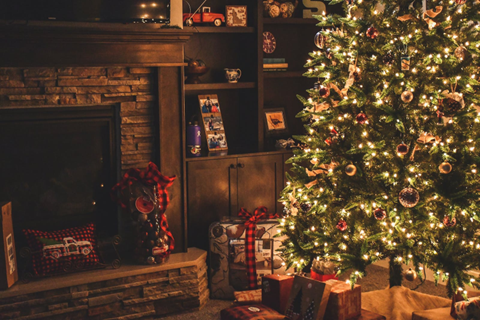When we think of Christmas, we inevitably picture in our minds all those lights and decorations that embellish our houses and cities, as well as we imagine the scent of the delicious December 24th dinner or December 25th lunch. We will also think of the spark of joy of the little ones when they open their gifts, and the warmth we experience when we spend a holiday with our family and our loved ones.
This celebration of Christian origin is not an exclusive tradition of our country, but it has spread throughout the world enough to be adopted by many other countries; Naturally, given that it represents one of everyone’s favourite moments of the year. But seriously, Christmas is different for every country; Many elements are shared between countries, but there are also different traditions and even different meanings for Christmas. We want to share with you what we know: we will show below how Christmas is celebrated in some countries:
England
Streets and houses are decorated with many colourful lights and Christmas trees since the beginning of December. Although, the celebration does not happen on December 24th; The planning for the celebration to occur on the following day is made instead. Children hang socks in the living room or somewhere in the house for Santa Claus to fill them up with gifts. Christmas is then celebrated on the 25th, when the family exchanges gifts and, after they open them, everyone enjoy a meal.
On December 26th, Boxing Day is celebrated, or also known as the second day of Christmas. It is considered a national holiday where people traditionally give boxes with donations to others in need; The word “boxing” refers to “box”.
France
In France, Christmas takes place on the night of December 24th. As in many other countries, it is very common to find Christmas decorations such as colourful lights, pine trees, and many other flashy ornaments. Although France is considered a secular country, many people assist to the Midnight Mass or Messe de Minuit, which is celebrated in the afternoon.
The family dinner is perhaps the most important part of the whole tradition. Typical French dishes are generally served on the table, such as foie-gras or escargots (snails). The main course may be either stuffed turkey or capon. Traditional dessert Bûche de Noël (or Christmas log), which is a kind of cake rolled up and covered in chocolate, is likely never missing on this celebration.
At the end of dinner, children leave their slipper under the tree before going to sleep, and the next day they find it full of sweets. In France, it is Santa Claus, or Père Noël, who is in charge of leaving sweets and some gifts for children who have behaved well throughout the year.
Italy
Italian people share the following saying: Natale con i tuoi, Pascua con chi vuoi, which can be translated as “Christmas with your loved ones, Easter with whoever you want”; This saying gives us a good idea of how it is celebrated in Italy. The typical Christmas decorations begin to be placed on December 8th, which include coloured lights, Christmas trees (which usually is a natural pine) and the nativity scene, also known as a “crib” or “manger”; the latter consists of a tiny representation of Jesus’ birth, according to the Christianity.
On the night of December 24th, la cenone (or great dinner) is held. Traditionally, the whole family meets to have dinner and spend time together. The most common main course is fish with vegetables, although, it varies depending on the region. The most important thing of Christmas is that there is plenty of food on the table and that the whole family is together. Italian people usually eat panettone for dessert, which is a type of sweet bread with chocolate or candied fruit.
On Christmas night, Babbo Natale, who is the Italian version of Santa Claus, is the one who brings gifts to children if they are asleep. Also, there is a tradition similar to the Three Kings of January 6th, called Befana. It is told that a woman gives sweets and gifts to children who have behaved well, but if they have behaved badly, she only gives them a piece of coal.
Portugal
We are very likely to find the houses of Portugal decorated as in Italy and other countries. The Christmas pine is never missing nor adorned with hanging spheres and colourful lights. Next to the pine, there is always a place for the manger. It is also common to see manger scenes of different sizes in churches and even on the streets.
The Christmas dinner of December 24th is called Consoada in Portugal. The traditional dish is boiled octopus or cod, although stuffed turkey has also gained popularity in recent years. A dessert that is never missing in Christmas dinner is the Bolo Rei, which is quite similar to the well-known Mexican Rosca de Reyes.
After dinner, families usually go to the Missa do Galo, or Midnight Mass celebrated exactly at midnight. Returning home after mass, the image of baby Jesus is placed in the manger. Gifts are also exchanged, either at that time or along December 25th.
Brazil
Christmas in Brazil is a bit different. While most countries celebrate Christmas in winter (just like us), in Brazil it’s midsummer. It is very common to see many people celebrating on the beach during the Christmas season. There are also lots of Christmas trees (mostly artificial pines) and decorations that symbolise Christmas, as well as the nativity scene, called presepio/manjedoura in Portuguese.
By tradition, the family gathers for dinner on the night of December 24th, and not only the close family, but the whole one instead, including uncles, cousins, grandparents, etc.; It’s a big family dinner. In the past, Brazilians used to wait until midnight for Christmas dinner, but today many have chosen to eat earlier. Among the main courses, we may find roast turkey and pork leg, and for dessert, they often have Italian panettone, or pavê, which is some kind of Brazilian tiramisu.
After dinner, people usually exchange gifts and hugs. In the early morning of December 25th, it is said that Santa Claus goes to relax on the Brazilian beaches and that he shows appreciation by leaving gifts for the children. Brazilians typically represent him with his usual red suit, but using shorts instead of pants, and relaxing under the sun, in the middle of the waves.
What do you think about Christmas? How do you celebrate it? Let us know in the comments!
MERRY CHRISTMAS


